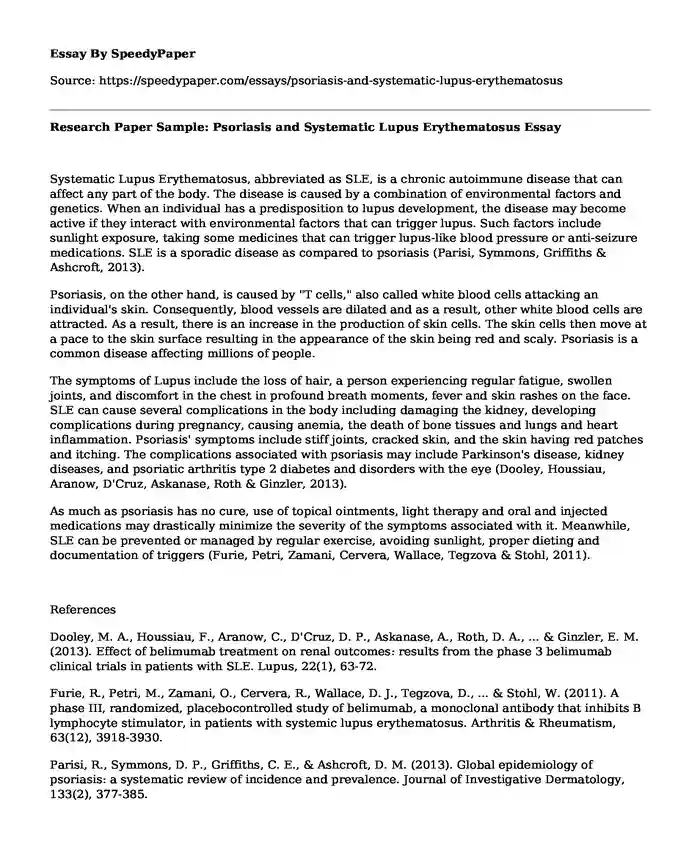
| Type of paper: | Research paper |
| Categories: | Healthcare |
| Pages: | 2 |
| Wordcount: | 435 words |
Systematic Lupus Erythematosus, abbreviated as SLE, is a chronic autoimmune disease that can affect any part of the body. The disease is caused by a combination of environmental factors and genetics. When an individual has a predisposition to lupus development, the disease may become active if they interact with environmental factors that can trigger lupus. Such factors include sunlight exposure, taking some medicines that can trigger lupus-like blood pressure or anti-seizure medications. SLE is a sporadic disease as compared to psoriasis (Parisi, Symmons, Griffiths & Ashcroft, 2013).
Psoriasis, on the other hand, is caused by "T cells," also called white blood cells attacking an individual's skin. Consequently, blood vessels are dilated and as a result, other white blood cells are attracted. As a result, there is an increase in the production of skin cells. The skin cells then move at a pace to the skin surface resulting in the appearance of the skin being red and scaly. Psoriasis is a common disease affecting millions of people.
The symptoms of Lupus include the loss of hair, a person experiencing regular fatigue, swollen joints, and discomfort in the chest in profound breath moments, fever and skin rashes on the face. SLE can cause several complications in the body including damaging the kidney, developing complications during pregnancy, causing anemia, the death of bone tissues and lungs and heart inflammation. Psoriasis' symptoms include stiff joints, cracked skin, and the skin having red patches and itching. The complications associated with psoriasis may include Parkinson's disease, kidney diseases, and psoriatic arthritis type 2 diabetes and disorders with the eye (Dooley, Houssiau, Aranow, D'Cruz, Askanase, Roth & Ginzler, 2013).
As much as psoriasis has no cure, use of topical ointments, light therapy and oral and injected medications may drastically minimize the severity of the symptoms associated with it. Meanwhile, SLE can be prevented or managed by regular exercise, avoiding sunlight, proper dieting and documentation of triggers (Furie, Petri, Zamani, Cervera, Wallace, Tegzova & Stohl, 2011).
References
Dooley, M. A., Houssiau, F., Aranow, C., D'Cruz, D. P., Askanase, A., Roth, D. A., ... & Ginzler, E. M. (2013). Effect of belimumab treatment on renal outcomes: results from the phase 3 belimumab clinical trials in patients with SLE. Lupus, 22(1), 63-72.
Furie, R., Petri, M., Zamani, O., Cervera, R., Wallace, D. J., Tegzova, D., ... & Stohl, W. (2011). A phase III, randomized, placebocontrolled study of belimumab, a monoclonal antibody that inhibits B lymphocyte stimulator, in patients with systemic lupus erythematosus. Arthritis & Rheumatism, 63(12), 3918-3930.
Parisi, R., Symmons, D. P., Griffiths, C. E., & Ashcroft, D. M. (2013). Global epidemiology of psoriasis: a systematic review of incidence and prevalence. Journal of Investigative Dermatology, 133(2), 377-385.
Cite this page
Research Paper Sample: Psoriasis and Systematic Lupus Erythematosus. (2022, Jun 14). Retrieved from https://speedypaper.com/essays/psoriasis-and-systematic-lupus-erythematosus
Request Removal
If you are the original author of this essay and no longer wish to have it published on the SpeedyPaper website, please click below to request its removal:
- Essay Example: Criminal Law Research
- Free Essay in Religion: Character Sketch for Gospel of Mathew
- Free Essay with a Research on Body Image of College Students
- Free Essay on a Local Trauma System and Disaster Preparedness
- Free Essay Presenting Ethical Constructs of Ethics, Moral, or Legal Standards
- Free Paper Sample: An Overview of the Stationery Business in Germany
- Essay Sample on The Mark on the Wall
Popular categories




